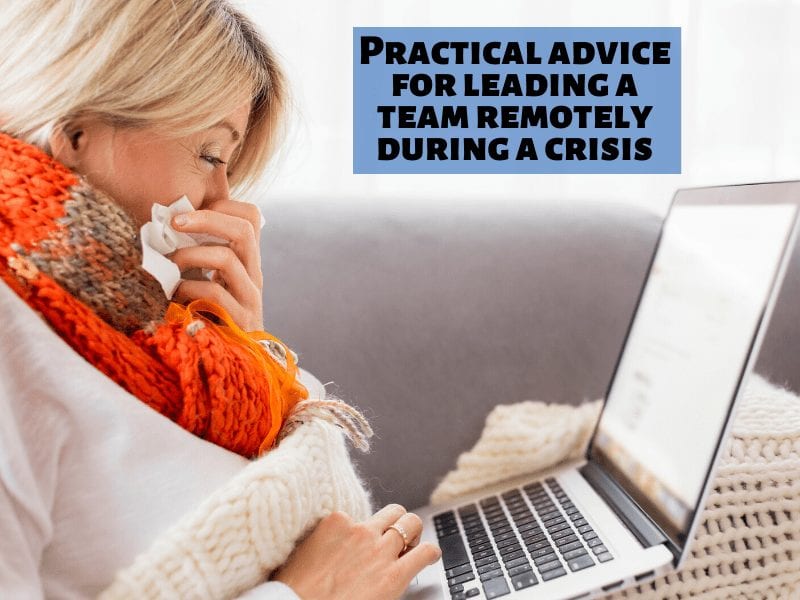Millions of employees across the globe are now working remotely in response to the CoVID-19 outbreak. For leaders, this is where you earn your money and why you were put into a leadership position to begin with. Here are some of practical thoughts on leading teams remotely during a crisis.
This week’s Travel Tip Tuesday post is a bit of a departure from other topics. Instead, we are focusing on some content that is germane to the coronavirus pandemic now sweeping the world.
Your team is now remote…and the sky is falling…now what?
Many of your employees are likely feeling very uncomfortable right now. The sky appears to be falling (I say “appear”….because it’s really not) and regardless of whether you think the panic exhibited by many people is rational (it’s not) things have changed (at least temporarily) for most of us.
Let’s consider what’s changed in the last few days:
- Most companies (that can) have implemented some form of a work-from-home policy
- Most companies have eliminated all non-essential travel
- The US Federal Government has implemented wide ranging international travel bans
- There is serious talk of implementing an interstate travel ban
- Many communities are experiencing massive panic buys. This breeds even more panic buys.
What hasn’t changed for many companies (at least in the tech industry, where I operate):
- Customers still need cared for
- Systems still need to be monitored
- Systems still need to run and operate (many at 4 9’s or greater)
- Calls for support still need to be answered
How you lead your teams during this crisis is important. Will you succumb to the pressure that the “herd” is right now? Or will you rise above this and calmly lead your team like a human being?
I’ve assembled a few thoughts on this subject that I wanted to share with my readers – many of whom I know are in leadership positions. It’s an imperfect discussion, for sure, but my hope is it will get the leadership juices flowing in each of you.
What’s not covered in this post
In the interest of clarity, here’s a few things that I don’t cover in this post.
- Business Continuity Plans (which often contemplate succession planning or the technical aspects of actually executing the job during a crisis) are NOT the focus of this short essay.
- This is not a post on the general aspects of leading remote teams (but rather about leading them during a crisis)
- This is not a post about general leadership
I’ve tried to keep my advice limited to some ideas on leading a remote team during a crisis such as the one we are facing now.
Practical Advice for Remotely Leading your Team During a Crisis

Leading a team during a crisis is a test in and of itself. When that team is remote, it can be more challenging. Here’s a few suggestions above and beyond what you might already do as a leader under normal circumstances and above and beyond the steps you may be doing in the execution of your business continuity plan.
- Clear communication is crucial. Leading remote teams is hard enough but during a crisis it can become much more difficult. Clear communication is crucial. And it should use multiple means including phone, video call, email, chat and other methods (e.g. posting to an Intranet, etc). Be crisp, simple and when necessary repeat your communication. Now’s not the time for you, as their leader, to go dark.
- Be decisive. Employees hate it when leadership waffles or is unable to make decisions. In a crisis try to be decisive to mitigate doubts your staff may have. Make a decision, explain it, and move on. If it was the wrong decision, adjust.
- Be understanding. Your employees are probably feeling very unsettled. Their spouses may be very nervous. Their budgets may be tighter now. Maybe they were able to get stocked up, maybe they weren’t. Maybe they panicked and overspent and now are going to maybe miss their rent payment. Be understanding if they are a little distracted.
- It’s about more than mission accomplishment. When speaking with staff resist the urge to limit your conversation to work related topics (e.g. do you have enough to do your job, or how is it going working remote). Sure, asking those work related questions is important, but don’t stop there. These are uncertain times. Ask your staff if they have enough food. If their families are holding up. Have an interest in their total well being – not just their work status. And it should be more than lip-service. Actually care about them and show it (if you don’t, already, you shouldn’t be in charge, btw).
- For example, instead of asking “Is everything ok at home?” ask “Are you caring for anyone who’s at risk?” “Do you have enough food and supplies?” They may not want to tell you they are more concerned or may be embarrassed.
- You may have a dedicated office, but your staff may not – be ok with that. I have a lot of young employees who work for me. First job out of college type folks. Many still live with their parents and/or have young families. They live in 2 bedroom apartments. They have a few kids, etc. They may not want to turn their camera on because they are embarrassed by the chaos of their lives. They may have some background noise. Be ok with all of that, as best you can.
- Consider daily or weekly stand ups to keep folks more connected. This will vary based on your specific business circumstances, but consider holding more frequent meetings with your now-remote team. This will help keep your staff connected and feel less distant.
- Don’t forget to take care of yourself. Chances are you have a boss too. Don’t be unwilling to voice your concerns to your boss and ask for help if needed. If she/he is a good leader they will be ready and willing to assist.
Thanks and be safe
I’ve managed teams through hurricanes and other natural disasters and I’ve been through them myself but this is a different experience. Something seems a little different about this one. Perhaps its the panic that seems to be setting in (which is baffling to me), but something is different about this one.
I’ve been checking the temperature of my staff for a few weeks now and they are a bit rattled – unlike anything I’ve seen before. But, there’s no doubt in my mind we will get through all of this and come out of the other side stronger than ever. Your staff will too if you can help provide steady leadership for them during this time.
How about you? What’s important to do as a leader during times of crisis such as this? Drop us a comment or tweet us.
Affiliate Disclosure: As an Amazon Associate I earn from qualifying purchases. I may also earn commissions from other affiliate programs as applicable.

